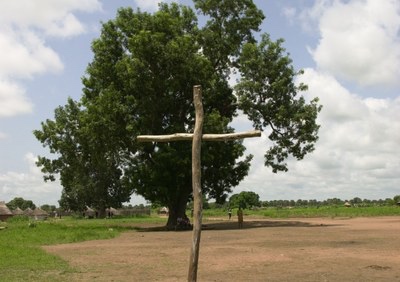The South Sudan Council of Churches, an ecumenical body of seven members and two associate members, held its first general assembly since the independence of the largely Christian and animist country in 2011.
Delegates from churches, guests and observers converged at the capital Juba from 26th to 29th August under the theme “The Power to Forgive – Healing messages in the broken society in the spirit of forgiveness in genuine confession.”

PICTURE: Peter Williams/WCC
Roman Catholic Archbishop John Baptist Odama of Gulu, renowned peace maker, was a guest at the meeting, which also had representatives from regional bodies including the All Africa Conference of Churches, Association of Member Episcopal Conference in Eastern Africa and Sudan Council of Churches. The ACT and Caritas networks were also represented.
“This is the first general assembly since the independence of South Sudan. There are a number of key decisions to be made in this assembly,” wrote Anglican Archbishop Moses Deng Bol of Wau as the meeting got underway.
Key resolutions were been made at the assembly and new council officials elected. African Inland Church Bishop Arkanjelo Wani will lead the council as the chairperson, while Presbyterian Church moderator James Par Tap will be his vice. Roman Catholic priest, Fr James Oyet Latansio will continue in his position as the general secretary.
Among other key resolutions, the assembly hailed the work of the past leadership, while resolving to strengthen the position of inter church committees. It affirmed them as the implementing arm of the council at grassroots level. With the conflict tearing apart communities, the assembly will strive to find new ways of working to foster unity, love and forgiveness, among the people.
In 2015, the South Sudan Council of Churches created the Action Plan for Peace. The home-grown and church-led strategy seeks to address the root causes and longer effects of the South Sudan conflict through advocacy, neutral forums, healing and reconciliation.
“As we move forward, we resolve… to affirm the Action Plan for Peace,” said the council in a statement.
The assembly convened amid increased concerns about the lack of progress in setting up of institutions a year after the signing of the Revitalised Agreement on the Resolution of the Conflict in South Sudan.Last week, the UN Commission on Human Rights said it was concerned about the delayed formation of transitional justice, accountability, healing and reconciliation structures.
“We resolve…to call a workshop of concerned church leaders and personnel to issue a statement of the church’s position on the implementation,” said the leaders.
At the same time the UN’s Commission’s chair, Yasmin Sooka, said that overall, the conflict had decreased, but had been localised especially those linked to land, resources and cattle. According to the UN official, impunity for sexual and gender violence was continuing.
This article was first published on the World Council of Churches’ website.





